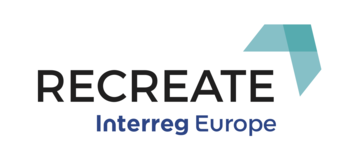The Interregional Joint Stakeholder Workshop took place in Greece on 1st September 2022.
The event was organised by the Lead Partner Coventry University Enterprises Ltd and was held in Skiathos Island, back-to-back the RECREATE final dissemination event that took place on 31st August 2022 as a Special session of the 6th Conference on Sustainable Urban Mobility – CSUM 2022.
The event started with two keynote speeches: one about the development of the Urban Air Port in Coventry, delivered by a representative of the Coventry City Council, the main stakeholder of the West Midlands region; and the other one about the impact of COVID-19 on Transport policies in Greece, delivered by the President of the Association of Greek Transport Engineers.
The following presentations focused on COVID-19 responses on transport SMEs support and each region showed how they helped businesses to survive and innovate during the pandemic.
During the pandemic, in the West Midlands region cooperation between local stakeholders grew exponentially. The main issues identified were linked to supply chain disruptions, rising energy costs, shortages and rising costs of goods and materials, labour shortages, cashflow challenges, uncertain business and consumer confidence. Several initiatives were put in place to support businesses. The two most relevant ones for the region were:
- The Government Loan Schemes, business loans offered by the UK Government to businesses affected by the COVID-19 pandemic: Bounce Back Loans of up to £50,000 offered to all SMEs; Coronavirus Business Interruption Loans of up to £5m for smaller businesses; Coronavirus Large Business Interruption Loans of up to £200m for medium-sized and larger businesses.
- The Coventry & Warwickshire Specialist Grants, grants issued to local SMEs impacted by the COVID-19 pandemic. These grants offered between £1,000 and £3,000 to SMEs to make necessary innovations or modernise practices to safeguard their longer-term competitiveness following the Coronavirus pandemic.
2020 was a deeply recessionary year for the Greek economy, with the GDP in current prices falling by 9.6%, marking the second biggest recession in the EU after Spain. For the majority of small businesses, the turnover was severely reduced: compared to 2019, SMEs with losses almost doubled, while the companies that recorded profits were reduced to half. Several support measures were adopted by the Greek government, the two most relevant ones were:
- The “NISIDA” programme, offering grants between 2000€ and 10000€ to small and micro-enterprises affected by COVID-19 in the South Aegean Region (this was approved for at least 10 transport SMEs).
- Support Measure for Bus, Railway, Tourist and Road Transport Tourist Enterprises, subsidies to compensate the losses due to impossibilities of using all the seats available on public transport.
Also Lithuania suffered issues linked to supply chains disruptions, reduced use of public transport and mobility services, labour shortages. However, in some sectors like Transport and storage and ICT, the R&D investments grew. Between the measures put in place to support businesses, there were:
- Subsidies to businesses adversely affected by COVID-19 to support the liquidity of companies where 925 companies from Transport and storage sector received support.
- The E-commerce model COVID-19 dedicated to support business digitisation, particularly in the field of e-commerce.
The Transport and logistics sector in South West Oltenia region was one of the most affected by the pandemic with unexpected cuts of cash, sharp decrease of business volume and activity restriction, layoffs of employed personnel. Under these adversities, the government worked out specific measures to help businesses to survive in the unexpected difficult conditions, like:
- Investments in productive activities to support SMEs affected by the pandemic to grow in regional, national and international markets and engage in innovation processes.
- Working capital for restarting economic activities for SMEs that could request non-reimbursable financing of up to €125,000 to cover stocks of raw material, supplier debts and equipment.
The final session of the event was a Panel discussion with executive policymaker representatives from each region. This was a moment to highlight what went well and what would have gone better with regards to transport SME support provision and to discuss other current issues linked to the post pandemic, the war in Ukraine, the gas and energy prices increase.
Participants of the workshop were all RECREATE Partners and their local Stakeholders from UK, Greece, Lithuania and Romania.

